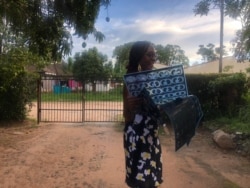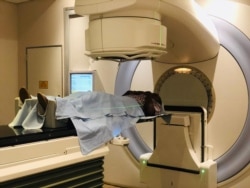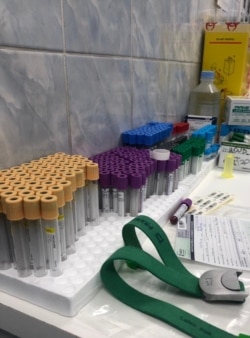A young Zimbabwean woman who found herself battling a rare form of cancer for someone of her gender and age, is now a champion for her fellow citizens who suspect they may have cancer, but don’t know what to do.
Marlene Chiedza Gadzirai was diagnosed with stage three colorectal cancer last year, after ignoring symptoms for years. She has now turned her regret for not reacting sooner, to a mission to help spare others the pain.
"I was not the model patient, I was not the model person. I was, I am one of the people who actually got their cancer diagnosed when it was at a very critical stage, and yet I'm thinking if I had gone to see a doctor and sought a diagnosis, that cancer would have been caught maybe at stage one,” Gadzirai confided to VOA Zimbabwe Service.
Shocked by the diagnosis at the young age of 33, after years of ignoring crucial symptoms of colon cancer such as prolonged constipation, Gadzirai had to endure six months of painful radiotherapy and chemotherapy, that brought on early menopause and took away her chance to one day be a mother.
“The intensity of this treatment maybe would not have happened, maybe I'd have a chance of having a baby which I don't have anymore because of the menopause that I’m going through, coming from the side effects from the treatment,” explained Gadzirai.
Instead of withdrawing into her herself in self-pity for not having acted sooner, Gadzirai took to social media to share her ordeal, and was overwhelmed by the number of people who reached out to her, seeking advice and guidance.
She said she felt a special connection with those afflicted with cancer.
“So, I started talking to different people and, and going to the extent of you know, saying let me book for you, let me talk to this doctor for you. And sometimes I’d actually just go to my oncologist’s rooms, sit with patients and start talking and laughing and joking with them. So that's part of my healing, being a catalyst, trying to understand what are you going through? I am here, I understand what you're going through because, sometimes as human beings, if someone has not been in an accident and you are in an accident, you feel like no one understands. You feel like the whole world doesn't understand. I felt bad when I was going through, but I was, like, no, you don't understand what cancer is. This is painful,” said, Gadzirai, gripped by emotion.
Self-described as stubborn and independent, Gadzirai recounted her own paralysis when her doctor gave her the devastating news.
"So, I got out after finishing with the doctor and I sat in my car and I started crying. I cried, I cried for ooh, I cried for literally an hour or so, really crying, you know, heavy sighs, I would run out of breath, there was a lump in my throat and I didn't know what to do.”
Though both her parents are living, Gadzirai chose to share the news first with her best friend, instead, fearing causing her parents too much distress. The friend decided they needed to know, and told them despite her objection.
“And so my friend is like no I think you actually already in panic mode, there’s no way you're going to keep a cancer diagnosis away from your parents. And I said, no, no, no I'll be fine, let me handle it alone. You know over these last years, remember I was on painkillers so I can handle these, I don't want them to know. I didn't want them to stress. But then my best friend, he did what he did, called my mother and, yeah, that's how my parents got to know. It was my friends who told my parents, and because I, I just didn't know what to do,” she reflected.
Some of the side effects of her treatment, explained Gadzirai, in addition to the physical reactions to the treatment, was depression, something she said she continues to fight off, though with difficulty.
"I did mention that I went through depression. I'm still trying to get over it. Yeah because I felt like somehow at some point I really couldn't mourn myself, and you know when the reality set in that I'll probably never have a child, I started questioning God and saying, so I fought this cancer only to spend the rest of my life alone without a child, without a husband. So, I started thinking in sadness and started feeling worthless. But then I then had to sit with my doctor, my advisers from church, my friends as well and, you know, try and step out of it and snap out of it. And then, I then have been trying to just occupy my time and trying to stay positive.”
Staying positive has not come easy, though, admits Gadzirai, who said she lost faith in God during her ordeal.
“My faith was shaken and I'm working on my spirituality. I'm not going to be one of those people who say, you know, God is good, I just felt the presence of God. But, I was angry with God, I was furious, and so I feel like I'm trying to get back that relationship with God and trying to get back on my spirituality.”
Gadzirai credits her oncologist for pushing her to choose to live, and trust God. She recalled how her doctor responded to her question about how long she had to live, after her diagnosis.
She said the oncologist told her that “cancer is not always about, you know, you have three weeks to live or you've got three months or six months to live. Let's walk the journey together and the first thing he said to me was, I need you to want to live. I'm here so that I journey with you, but your willpower is what I'm going to bank on. Your willpower and God. And he said you know, the ultimate, ultimate decision lies with God, but I am here, as you know, someone who is going to be a catalyst towards this, but I need you to walk with me in this journey because I was a mess, I was a total mess."
She underwent many radiotherapy sessions, which she nearly quit due to pain and the weight loss also scared her.
“In terms of radiotherapy, I needed, is it 40 days, 40/40 sessions of radiotherapy. So sometimes I would, to be honest, sometimes, I would call my doctor and just say the pain is too much, I can't, I can't get up. I can’t go for radiotherapy today. And so if I miss a day, he would call me, talk to me sternly and counsel me about, you know, how tough cancer treatment was. Sometimes I wanted to give up because chemotherapy as well, it was, it was very tough on me. I lost a lot of weight from a nice 65kg, I was down to 45-point something kilograms. And sometimes I hated looking at myself in the mirror without, without my hair. I actually cut off my hair because I was anxious about waking up and seeing chunks of hair falling out, so I didn't want that experience. I cut my hair. So, in essence it took six months.”
She completed radiotherapy and chemotherapy last year and is currently going for regular checkups.
“I finished radiotherapy in 2020, chemotherapy as well. Chemotherapy finished a few months later. And so, what was happening from there, I've been going … I have had to go through scans every three months, but within those three months I also go for regular checkups with my doctor. They are looking at my iron levels, my blood count, just to check, if, you know, there is no recurrence of cancer because there is always a risk after cancer treatment especially in the first two years of remission for the cancer to come back. So, my doctors are keeping a close eye …”











